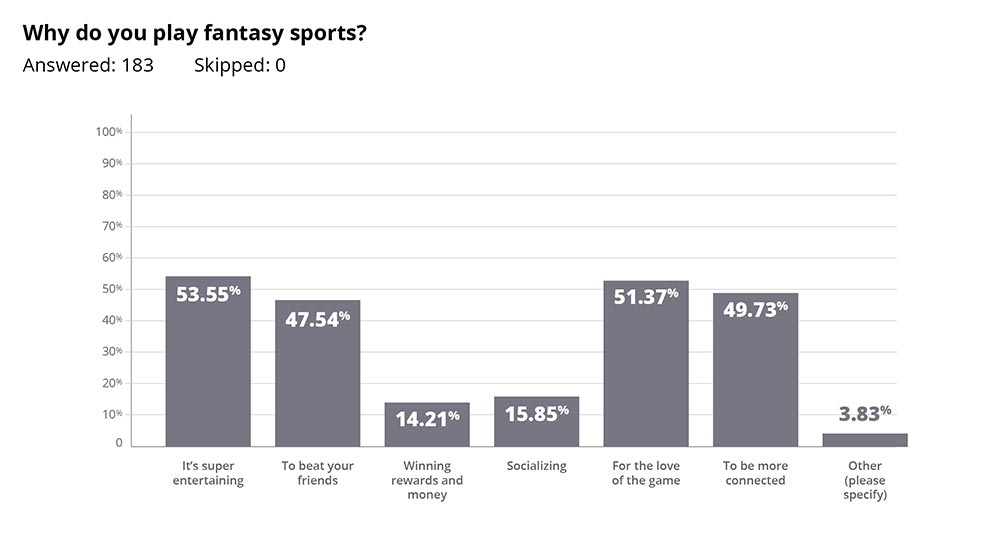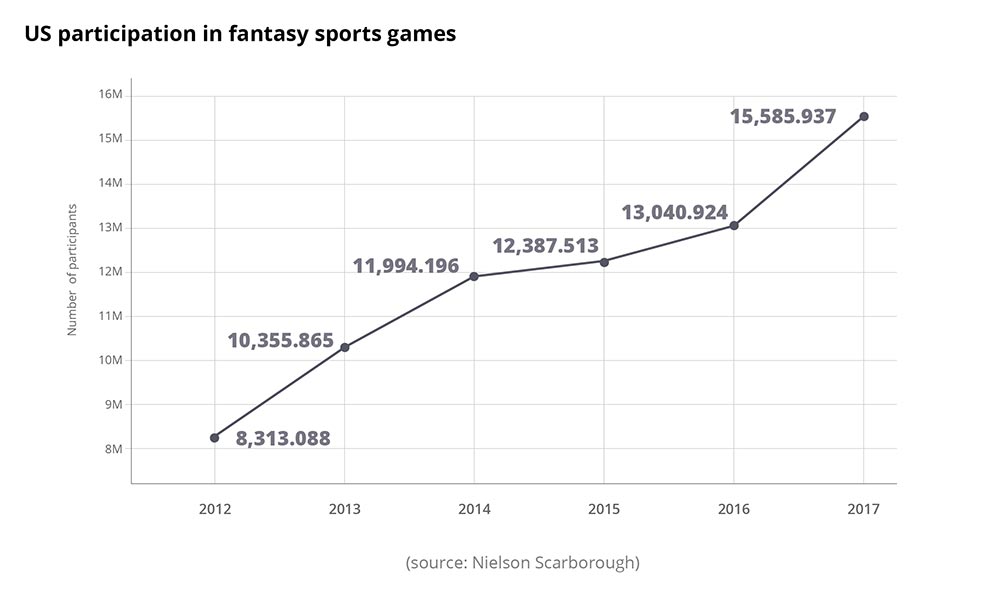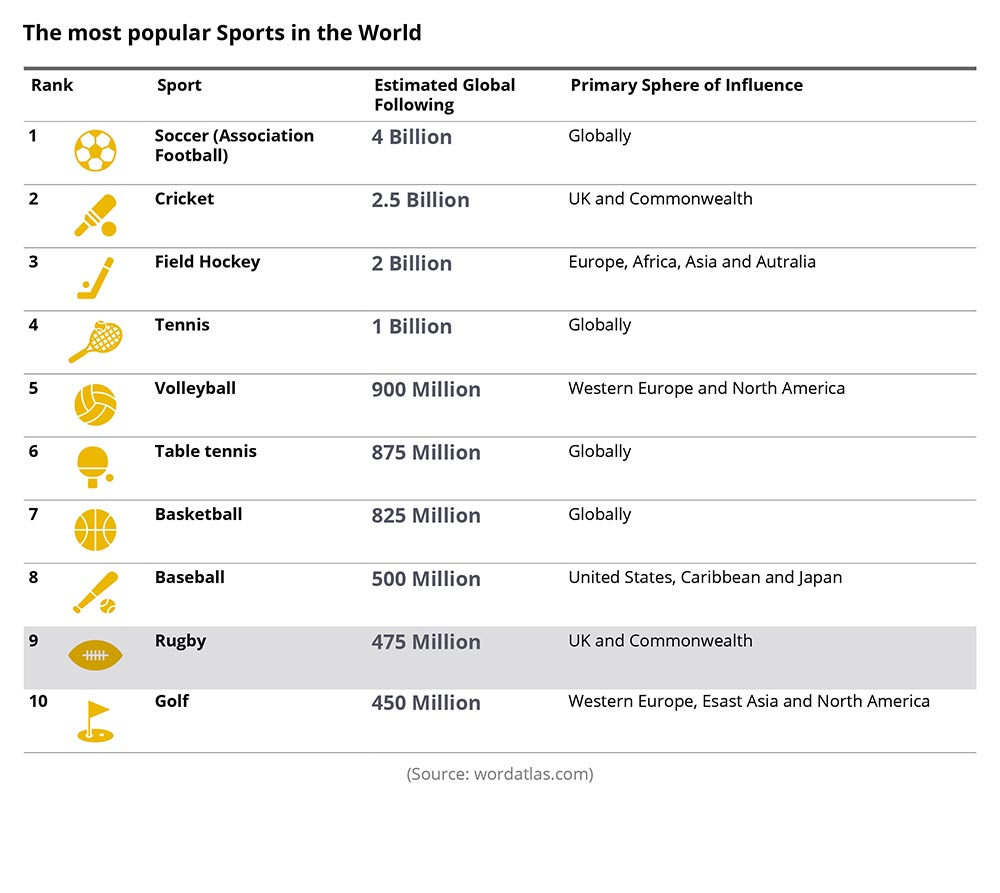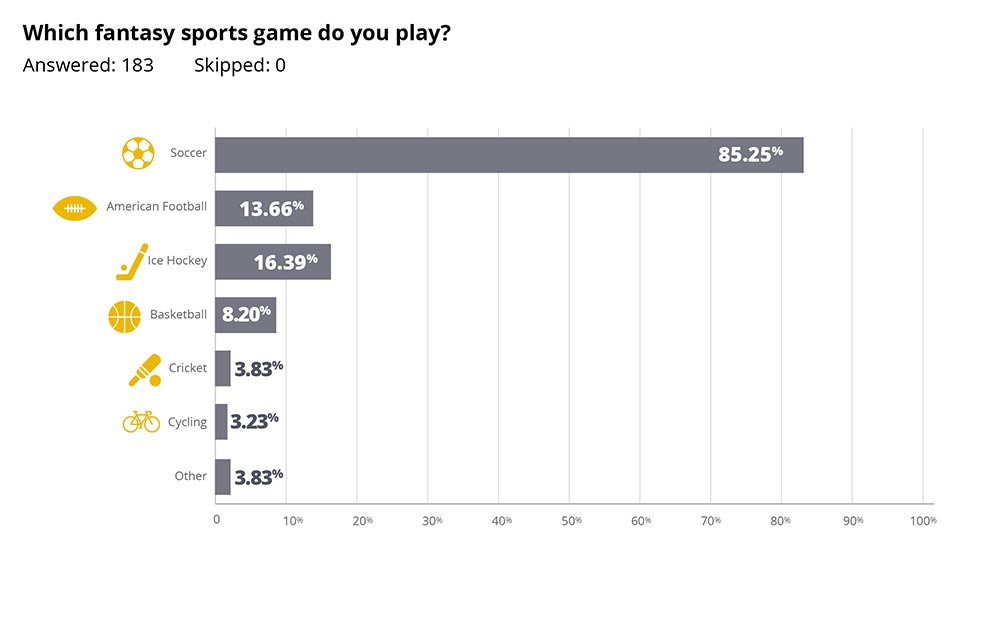
We analyze the curious world of fantasy sports games, their importance as a platform for interaction with fans and the industry’s interest in connecting, through them, with a new audience that experiences sport from the position of ‘manager’
The phenomenon of fantasy sports could be very surprising for non-consumers of such an activity, but have you ever been caught in the middle of a conversation like this?
– Which team do you want to win this game?
– “I don’t know, but the away goalkeeper should keep a clean sheet and the home striker should score at least once because I got them in my fantasy team”.
This reply seems to be accurate as the followers of fantasy sports often do not care about the final outcome of the game, their focus is solely on the individual performance of several players from one or both teams.

According to the Cambridge Dictionary definition, fantasy sports are “games in which you choose a team of real sports players from different teams and win points according to how well the players play each week. The main point about fantasy sport is that it is nothing to do with football, or baseball, or ice-hockey, at all.”
The one word that stands out from the above-mentioned definition is games. Jon Radoff in his book History of Social Games mentions that “the history of games dates to the ancient human past as games have always been an integral part of all cultures and are one of the oldest forms of human social interaction.”
The main question here is, is just watching the game enough for all stakeholders or are all the involved parties looking for something more? Is it still only a game or like the famous slogan from EA Sports says: “It’s in the game”?
We do believe that fantasy sports games are more than just a game because this type of entertainment could present an interesting tool for fan engagement. This article aims to introduce the fascinating world of fantasy sports games, demonstrate its importance as a fan engagement platform and share the results of a brief pilot research study of this phenomenon among approximately 200 fantasy sports games players around the world.
Definition of games
Having a university background in cultural management, a fairly big part of the study was dedicated to cultural history and the work of Dutch cultural historian Johan Huizinga. It was Huizinga that stated in his publication from 1938, Homo Ludens, that “games were a primary condition of the generation of human cultures because the playing of games is older than culture, for culture, however inadequately defined, always presupposes human society, and animals have not waited for man to teach them their playing”. The importance of games can be witnessed in many different spheres of our lives, irrespective of whether we are children, students or top managers, and according to Huizinga’s theory, games were at the origin of many human activities like for example philosophy, language or war.
The omnipresence of games in culture is obvious. However, what is the definition of game? Switching from cultural history to philosophy, various philosophers such as Ludwig Wittgenstein or Thomas Hurka were looking closely at the definition of a game, but the description of a game’s characteristics by French sociologist Roger Caillois is the one that stands out. In his book Les jeux et les hommes (Games and Men), the author points out several main attributes of a game such as fun (the raison d’être of that activity), uncertainty (nobody knows the final outcome which provides an extra spark of adrenaline), unproductiveness (participation often does not result in anything useful apart from a good feeling from participating and being part of something bigger), accountability (a game provides a set of rules that holds every player accountable) and fiction (it provides an escape from everyday reality or routine).
Many, if not all these general characteristics of a game could also be applied to fantasy sports games. In the pilot research conducted via an online questionnaire that was shared on different fantasy sports games blogs in Europe and North America, most replies to the question “Why do you play fantasy sports?” were related to the aspect of “having fun” and “beating your friends”.

Origin & basics concepts of fantasy sports games
The official definition of fantasy sports games has already been mentioned above, but if you are still wondering what this is all about, imagine a group of friends or random people that are competing within their own mini-league. The competition is based on selecting different real-life players from various teams and seeing how they perform and amass different stats like goals or assists and turning these stats into points. These real-life players can be transferred or exchanged and, in some sports (like Fantasy Premier League for example), even made captain to score double the points. The winner of each mini-league is the player with the best score/most stats/most points.
The origins of the game are based in North America where the first fantasy sports games in basketball, American football, ice hockey and baseball were offered by Yahoo back in 1999. Other portals like ESPN or CBS followed shortly. Nowadays, there are millions of people around the globe who are playing some modality of fantasy sports game. According to Nielsen, overall participation in the US has grown significantly in recent years. Between 2012 and 2017, the number of fantasy sports games players went from 8 million to 15.5 million. American football, in particular, has positioned itself as a leader in the fantasy sports games market.

What is behind this massive growth? This kind of interest aroused plenty of curiosity in all types of media, which resulted in various fantasy sports TV shows, newspaper columns, blogs, forums where “experts” forecast the upcoming trends.
Even though the whole “madness” of fantasy sports games started far away from Europe, major events like the FIFA World Cup, Champions League and particularly Fantasy Premier League increased interest among European football fans.
Watching or following sports through the fantasy games lens brought many new fans that had never been fully immersed in supporting a club, or been regular followers of the game. The overall concept of this game is based on “outsmarting” your opponent, using your knowledge of the chosen sport in combination with obtaining the unique experience of competing year by year, and the overall excitement where the only thing that counts is the final points total. As a result of this, as more followers/fans were attracted to the game, it created interest among different stakeholders such as leagues, clubs, sponsors and media. The emergence of this phenomenon provides the additional spark for many players as they feel empowered by having the option to be something more than just an “armchair” general manager and, based on their own knowledge, experience and study of the game, they can either beat their friends or even win some financial reward. That’s right, the possibility to monetize this massive boom resulted in the diversification of the game in different modalities.
What are the principle types of fantasy sports games? There are two main types:
- Free fantasy sports games
- Daily or weekly fantasy sports games
The free fantasy sports games are based on the above-mentioned principles, where a group of friends or colleagues compete among each other in the selected sports. There is no official entry fee required to set up your own mini-league, but that does not interfere with the fact that there is often a small “unofficial & friendly” cash prize for the winner at the end of the season.
Nevertheless, the daily or weekly fantasy sports games are a different kind of animal because these games are based on daily or weekly results instead of waiting till the end of the season, they require an entry fee (the fee can vary depending on the importance of the league) and they are played against thousands of unknown players instead of against friends. Each fantasy sports platform offers its own paid leagues, but there are two market leaders that offer lucrative financial rewards on a daily basis and that are accumulating millions of players—FanDuel and DraftKings. Through daily fantasy sports games, both companies are still offering a kind of “legal” form of gambling in the US & Canada but, after a New York State judge ruled on October 29, 2018, that daily fantasy sports games are gambling and not friendly contests, the future of both could be in jeopardy.
Going back to the pilot research conducted on fantasy sports games, it is interesting to see the responses to the following question: “Do you play free fantasy (season long) sports games or paid daily fantasy sports games?”

Almost 87% of the responses show that players prefer to play free fantasy sports. Obviously, these data are based on pilot research and the majority of the respondents come from Europe where daily fantasy sports games are not that popular (70% from Europe, 25% from the US & Canada and 5% from the rest of the world—Asia & Africa).
Brief data comparison
The fantasy sports games boom started with American football, but soon it hit different sports as well. What are the most popular fantasy sports nowadays?
According to the website Wordatlas.com, football (soccer) has more than 4 billion fans around the globe, followed by cricket (2.5 billion) and field hockey (2 billion). Interestingly, basketball is seventh, baseball eighth, and both American football and ice hockey (two very common fantasy sports games) are not even in the top 10.

The overview of the most popular fantasy sports is slightly different. According to the Fantasy Sports Trade Association (FSTA), on the other side of the Atlantic, the most famous fantasy sports are American football, basketball, baseball, ice hockey and football (soccer). Meanwhile, in Europe, football is the unquestionable market leader. The pilot research also confirms this ranking because with more than 70% of replies coming from Europe, the absolute winner is football.

Apart from cycling, in the section “Others” sports like golf, NASCAR or F1 were also mentioned.
Going a little bit deeper, it would be interesting to have a look at different platforms that offer users to register for free. The market analysis research provided by the company Sleeper, says that in 2018 “the biggest fantasy sports are ESPN, Yahoo, NFL and CBS.” If we add another platform from Europe like Fantasy Premier League (FPL), UEFA Champions League Fantasy, La Liga Marca Fantasy, Bundesliga Fantasy or Tour de France Fantasy, the ranking could look something like this.

The overall purpose of this table above is to provide an overview of different platforms, but obviously the presented overview does not attempt to rank the best platforms or most used platforms, nor does it include several platforms like FanDuel, DraftKings, or Dream11 that require an initial entry fee.
If we compare this overview with the results of the pilot research regarding fantasy sports games, and considering that the majority of the replies (approx. 70%) came from Europe, the data below just confirms that football and Fantasy Premier League are dominating over there.

Fan engagement tool
Now, with a clear idea of what fantasy sports games are, it is important to return to the question at the beginning of this article. Are they still only a game?
With the overall rise in the importance of the internet over the past decade, the general perception of consuming sports has changed massively. The concept of a “connected fan” allowed greater involvement of different stakeholders (leagues, players, sponsors, media) which positively influenced the overall growth of the fantasy sports games.

Being permanently connected and consuming sport via different devices not only increases the overall aspect of virtual socialization, but also allows the leagues, clubs, media, sponsors and data providers to engage with fans in many different ways. Nevertheless, are fantasy sports games a fan engagement tool? The following points prove this hypothesis:
- Overall fanbase growth – The fact that fans can follow different sports/leagues/matches at the same time, and compete and interact with their friends, colleagues or random players from all around the globe, increases their overall interest in more sports, competitions and players, which is a very positive sign for the real-life leagues.
- Big data & stats optimization – It is no secret that fantasy sports games are based on data and stats, so the integration of data providers such as OPTA or STATS into the fantasy sports games presented an opportunity to offer players first-hand and live experience of actual data during the games. On the other hand, the leagues and/or several sports companies have the opportunity to analyse fans’ behaviour, to predict their buying habits & preferences and to help the integration of their partners/sponsors through the official websites, apps and chats.
- Media coverage – The increased popularity of fantasy sports games among fans aroused the interest of several media channels. Various fantasy sports TV shows, newspapers columns, blogs or forums where “experts” forecast upcoming trends have been created over the last few years. Moreover, different competitions have started their own channels to dedicate more and more space to fantasy sports games. In the case of the Fantasy Premier League, for example, a channel was created with the purpose of producing engaging content in the form of tips and hints about the upcoming matchday. Similarly, the NHL is publishing weekly fantasy rankings to help fantasy players to pick the best possible line-up.
- Player involvement – The phenomenon of fantasy sports games convinced many real-life players to participate. Many Premier League players have their own teams in fantasy premier leagues and these players are often engaging with fans through providing their own pick suggestions and hints, either via official league channels or their own social media channels.

- Deeper sponsor integration – According to the Nielsen report & the FSTA, 89% of fantasy sports games users are logging into the game platform or the official app at least once per month. The average time spent on the platform is approximately 40 minutes, which provides enough time for the league and its official partners to engage. It is up to the brands to come up with innovative ways of how to activate their agreements with those leagues and find a way to engage with fans. One example could be the Fantasy Premier League and EA Sports. The top picks of the week were announced through the FIFA game.
- Expansion – For a regular player of fantasy sports games, there is a higher probability to try different sports as well, which gives other sports a huge opportunity to expand their fanbases. The results of the pilot research showed that many players who started with one sport like football later continued with other sports like American football, basketball, hockey or cycling (Fantasy Tour de France has been growing its overall number of participants each year).
Ladies and Gentlemen, this is the new world of fantasy sports games. Brace yourself because this phenomenon is only just starting to realize its potential and it will keep growing.
Have you already picked your sport, registered your team, created the league and invited your friends and colleagues? What are you waiting for?
Bibliography:
- https://dictionary.cambridge.org/dictionary/english/fantasy-sport
- https://web.archive.org/web/20100527090108/http://radoff.com/blog/2010/05/24/history-social-games/
- Huizinga, J.: Homo Ludens, 1938, p. 1
- http://nideffer.net/classes/270-08/week_01_intro/Caillois.pdf
- https://ocw.mit.edu/courses/comparative-media-studies-writing/cms-600-videogame-theory-and-analysis-fall-2007/projects/w1.pdf
- http://www.thebaynet.com/articles/1016/thephenomenaoffantasysportsandhowitimpactsrealsports.html
- https://www.worldatlas.com/articles/what-are-the-most-popular-sports-in-the-world.html
- https://fsta.org
- https://www.nielsen.com/us/en/insights/news/2018/fantasy-is-reality-a-look-at-growing-engagement-in-fantasy-
- https://sleeper.app
- https://www.live-production.tv/case-studies/sports/creating-immersive-experience-connected-sports-fans.html







Hello there very interesting article about the fantasy sports app.. The given statistics was very clear and useful for understanding.. Thanks for sharing!!
Wow, it really helped when you talked about fantasy sports and how they’re focused on players. The other day, one of my cousins said he wants to start getting into fantasy football and asked if I wanted to join too. I know nothing about fantasy football, but I think your article will help me. Thank you for the insight on fantasy sports and how each of their fanbases is growing.